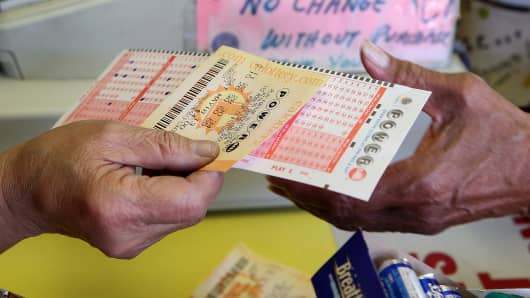Opponents of state and national lotteries have always been fighting an uphill battle. I mean, what chance do people arguing against government-run lotteries on moral, anti-poverty, or libertarian grounds have against those exciting mega jackpots and the absolute overload of clever lotto ads that have saturated the media for decades? The answer is: "none." And none of the anti-lottery groups has ever been very successful at doing more than just briefly delaying the growth of state-run lotteries into the massive industry that Americans now spend more than $70 billion on each year. People like to gamble and members of civilized societies have been playing some form of numbers games for thousands of years. The politicians know this and state lotteries are simply riding a winning wave of longstanding human nature.
There's just one thing about the eternal popularity of gambling and lotteries: even the people who love to gamble the most will suddenly stop playing once they believe the game may be rigged. And this has been a really bad year for state lotteries when it comes to that crucial issue of integrity. The biggest example is playing out right now, as what was once thought to be an isolated case of state lottery rigging in Iowa is now a scandal touching at least three more states and possibly a lot more. A former security director for the Multi-State Lottery Association who was convicted of rigging one lotto game in Iowa is now being investigated for rigging games in at least three other states. And since the Association ran games in 37 states total, investigators may soon find out that most of the country's state lottery games were compromised at some point by this one scammer alone.
Read MoreA $125K signing bonus... for the Air Force?!?
But that's not all. While the Multi-State Lottery Association scandal involves multi-million dollar random number draw games, investigative journalists in Florida, New York, and several other states have found numerous cases of convenience store owners winning scratch-off game jackpots at rates that defy any mathematical reality. Some have won jackpots of $2,000 or more dollars five or six times over the course of a year. Many store owners have been caught stealing winning tickets from legitimate winners, and police believe others have found some way to improve their odds of getting their hands on winning scratch-offs before their customers even walk in the door.
And then there's the egregious situation in Illinois, where a budget impasse resulted in jackpot winners of $600 or more receiving IOU's for more than four months before the freeze ended in early December. That wasn't just a case of players suspecting they wouldn't get paid, that was a case where the potential big winners all knew they weren't getting paid. Sales of lottery tickets understandably plummeted.
But the state lotteries still have an ace in the hole, and that's the news media. While every local TV newscast and most national broadcasts will have no trouble reporting on the latest $500 million Mega Millions or Power Ball jackpot, these lottery scandal and rigging stories just never seem to get much enduring attention. With all the advertising dollars state lotteries bring to the news media in general, it's amazing the scandal stories get much of an airing at all. And sponsorship money aside, explaining some of these lottery scam stories isn't easy and usually exceeds the abilities and investigatory budgets of most local news outlets.
So let me make this easy for everyone. There is no business in the history of business that hasn't at some point fallen victim to some instances of fraud and theft. That's especially true of state-run businesses. State lotteries have millions of dollars in cash passing through multiple hands every single day. Of course some people are going to try to steal some of it, and of course some people will do it successfully from time to time. The multi-million dollar, multi-state scandal coming out of Iowa involved software rigging and is more than just a case of simple theft, I'll grant you that. But it's just the latest example of what happens when human nature runs into piles of money. "Naive" isn't strong enough a word to describe anyone who doesn't think these lottery games haven't been compromised before and will be again.
Read MoreHow President Obama helps Trump win
Perhaps knowing that this kind of fraudulent activity exists and hurts everyone's already weak odds of winning a lottery will finally put a serious halt to what has been strong growth in consumer lottery spending for a generation. Or maybe it won't. I'm not crusading against lotteries, but I am pushing for a little more sunshine on these state-run enterprises. The government should have to earn the same trust privately owned businesses are required to earn. Everyone deserves a chance to know just how honest this form of gambling truly is before they make the decision to play. I wonder if New York State Attorney General Eric Schneiderman, who has already swooped in to "save" consumers from the dangers of daily fantasy football sites, is interested in halting New York state-run lotteries until a more thorough investigation can be conducted on their integrity. Yeah, I'm not going to hold my breath on that one. The same politicians and government entities with the power to publicly scrutinize and even shut down private businesses never seem to put publicly-run enterprises under the same kind of scrutiny.
For now, let's see where this investigation at the Multi-State Lottery Association leads. My advice to all the newsroom editors out there is to go with the results of this story if they want to increase their ratings or online clicks and shares. A good heist story is hard to resist, especially if your sponsors - and your audience - are the ones getting robbed.
Until then, caveat emptor everybody!



